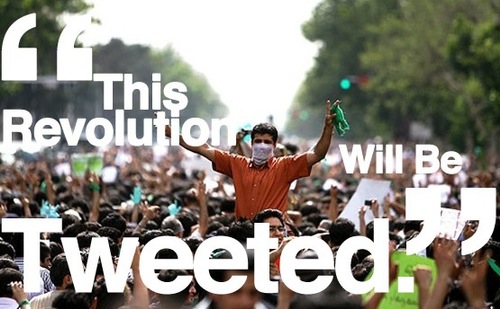
The Modern Tool of Social and Political Upheaval
By Olivia Adams
[divider]
[dropcap]O[/dropcap]ver the past few years, cyberspace has allowed for vast connectivity between peoples across the world and has created a forum for the quick exchange of ideas that can spark social and political change. As cyberspace becomes more advanced and accessible to people across the world, it will become an even greater catalyst for social and political change.
Cyberspace has started to become a catalyst for change, especially in the Middle East. According to former American Vice President Al Gore, as cited in Manuel Torres Soriano’s paper Internet as a Driver of Political Changes, cyberspace has “the capacity to strengthen democracies, foster sustainable economic growth, resolve environmental problems, and even generate a feeling of belonging to one single ‘human community.’” Soriano adds that “the vision of (the) internet (is) a form of technology with intrinsically democratic characteristics.”
Soriano then notes that those who believe in the power of the Internet to bring about democratic political and social change are known as “cyber-optimists” and are challenged by the conflicting views of “cyber-pessimists”. He sets forth the arguments of cyber-optimists.
First, he discusses that cyber-optimists believe that access to cyberspace’s interconnected networks empowers the individual and allows for individuals to demand transparency and responsibility from their governments. Cyberspace also gives a platform for individuals to express themselves freely.
He adds, “This form of technology becomes a key tool for collective action taking place within these societies that are lacking in freedom.” In other words, cyberspace allows individuals who are isolated to come together and share both their ideas and their discontent with existing political and social institutions. What is more, cyberspace provides a place in which action can be coordinated.
Soriano also contends that the Internet enables activists to dodge government censorship, sway international public opinion, and involve themselves in the domestic affairs of other countries. This in turn highlights domestic issues of countries in the eyes of the international community, making it harder for governments to commit atrocities or repress its populace.
Furthermore, the freedom of cyberspace promotes economic development and “social modernization.” This is because cyberspace lessens production costs and also allows for economic information to be passed quickly. More rapid economic development and social change assists pro-democratic movements.
One of the most striking examples of how increased access to the Internet has helped propel democratic sociopolitical change is the Arab Spring that swept across the Middle East and North Africa in 2010 and 2011. This series of protests, revolutions, and violent conflicts started in Tunisia when market vendor Mohamed Bouazizi lit himself on fire in protest of his mistreatment by state security forces. His self-immolation was filmed and disseminated through the Internet; he then became a catalyst for protests across the nation.
This was just one example of how during the Arab Spring, the Internet created a platform for individuals to come together, realize their dissatisfaction with their social and political institutions, and to organize change. In a study titled “Framing Bouazizi,” Merlyna Lim explains, “the 2010 uprising (in Tunisia) was successful because activists successfully managed to bridge geographical and class divides as well as to converge offline and online activism.” Cyberspace not only empowers the individual through the sharing of ideas, but also empowers individuals to create groups and movements for enacting desired change. While Tunisia remains the only country that benefited from the Arab Spring, there is still hope for other countries in the region to achieve similar goals using the power of the Internet.
The accessibility of the Internet and its ability to reach and organize individuals makes it an ideal tool to catalyze social and political change. Moving forward, cyberspace will continue to help spark important changes across the globe and will hopefully contribute to a freer world.
[hr]
Olivia Adams is a freshman in Davenport College who blogs about cyberspace. You can contact her at olivia.adams@yale.edu.